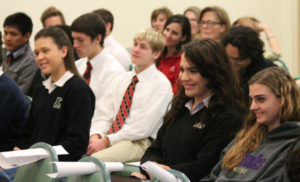
Two parents were happy to help students with a last-minute cram session last week.
Maggie Gillespie and Tim Burns, members of the Catholic Parents Advocacy Network, hosted a whirlwind meeting for 60 student council members from five area Catholic high schools Jan. 30. They filled a room at Ss. Simon and Jude Cathedral on National Appreciation Day for Catholic Schools to prepare students for a visit with local legislators later that day.
The Catholic Parents Advocacy Network is a committee of the Diocesan School Board now in its 14th year. Members spends its spare time lobbying on behalf of the students at the local and national level regarding school choice legislation. They thought it was time to teach high school students — some who register to vote as part of government class — to do the same thing.
Gillespie, the session’s main presenter, told the high school students that, yes, legislators are responsible for making laws, but the public they serve has the responsibility to be vocal.
“Specifically as Catholics, there are a lot of things that we believe in and have to protect,” Gillespie said.
She cited Bishop Thomas J. Olmsted’s “Catholics in the Public Square” booklet, now in its third edition. The roughly 45-page, pocket-sized book, addresses 35 issues in Q-and-A formats about a Catholic voter’s role in the political process and how to vote on key “non negotiable” issues.
“It’s so important that you step up and speak out,” said Gillespie, who has been to Washington D.C. many times on behalf of Phoenix’s Catholic school students.
That doesn’t mean constituents need to be nervous. Gillespie was giddy like a school kid the first time she went to the nation’s Capitol.
“Just remember, these people you’re meeting today, they’re your neighbors… they’re your elected officials,” Gillespie said.


Primarily, the Catholic Parents Advocacy Network wanted the high school students to thank their legislators for passing so many laws in recent years to help with tuition tax credit. That puts a face and a name to the work they’ve been doing.
Some students planned to share the rough percentage of students at their school who receive tuition assistance. Others planned to talk about themselves or their friends who never would have enrolled in the same school without tuition tax credits.
Sharing personal stories, “That’s gold,” Gillespie said.
She heard that in Washington, hearing from five constituents is pretty good. Local Catholic high schools sent at least that many student leaders to the Catholic School Rally at the Capitol. Legislative visits followed.
Download legislative tips from the U.S. Bishops for communicating with legislators
“Just remember, you guys are the message yourselves,” Tim Burns said.
“The big smiles, the big thank yous — they love it,” Gillespie said, “because it helps them when they go out on the floor.”
The duo presented a mock visit for the students starting with small talk about the rally. Burns pretended to be a legislator and Gillespie a student. Laughter filled the room when Gillespie, whose youngest is 30, tried to pass herself off as a high school junior.
The mock scenario mentioned a friend whose dad lost his job. The need-based scholarship kept that friend in school.
“We really do appreciate what you’ve done for our schools,” Gillespie said during the mock visit.
Claire Evans, a junior at Seton Catholic Preparatory High School in Chandler, said the role play helped prepare her for their visit with their senator. Her strategy: “professional but cool.”
“He was really nice. He was really easy to talk to,” Maddie McLean, a sophomore, said of the visit.
All 21 student council leaders also got a tour of the Senate floor and learned how bills are passed. Arizona’s bishops also met with a number of key elected officials that day.
The Senate floor unanimously passed SB 1172 later that day, a bill Senator Steve Yarbrough, whose district includes Seton, sponsored and the Arizona Catholic Conference initiated. It increases the contributions taxpayers can make under the charitable tax credit by eliminating the requirement that only those itemizing their taxes are eligible.





